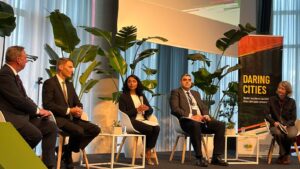Multilevel action for a 1.5 °C future
The COP29 High-Level Climate Champion, alongside mayors, subnational leaders and other representatives, convened at the Daring Cities 2024 Bonn Dialogues to reflect on the much-needed multilevel climate action to achieve the Paris Agreement’s goals. The event highlighted the importance of vertical and horizontal collaboration on a global scale to tackle the climate emergency head-on.
Strong references to multilevel action in the outcomes of COP28 marked an important moment for proponents of the importance of cities, towns, regions and other subnationals to achieving the Paris Agreement goals. This is particularly reflected in paragraph 161 of the COP28 Global Stocktake decision that urges Parties to engage in inclusive, multilevel, gender-responsive cooperative action, as well as in other relevant paragraphs of the UAE Consensus, providing direction for the next round of Nationally determined contributions (NDCs) due in 2025.
This inclusive, multilevel approach is critical for achieving progress toward the Paris Agreement’s goals to limit global temperatures to 1.5 °C within reach, raising the imperative to advocate for even more concerted action at all levels of governance.
Nigar Arpadarai, UN COP29 High-level CIimate Champion, confirmed that the next COP will take inspiration from the standard set by the COP28 presidency to prioritize multilevel action. “As the High-Level Champion, my role is to be a bridge between regional and local leaders and the decision-makers, ensuring that your message is heard and taken into account,” she said.
“The only way we can achieve tangible results is when we have everyone on board. We need a whole-of-society approach, leaving no one and no place behind through multilevel governance, ensuring that each department in the government is working effectively within their mandates and jurisdictions to enable this action,” she added.
CHAMP is the game-changing initiative
COP28’s multilevel action spirit is embedded in the Coalition for High Ambition Multilevel Partnerships (CHAMP) initiative, launched by the COP28 Presidency. 72 countries have endorsed CHAMP, committing to enhance cooperation with their local, regional and other subnational governments to collectively pursue efforts on NDC planning, financing and implementation.
“These endorsing countries represent around a third of the world population, a third of global emissions, and nearly two-thirds of GDP. This means we have gained momentum on multilevel action,” highlighted Jamila El Mir, Senior Adviser to COP28 High-Level Champion Razan Al Mubarak.
About CHAMP’s multilevel approach, Gregor Robertson, GCoM Global Ambassador and newly announced Special Envoy for Cities in CHAMP described, “It’s a way of leapfrogging and connecting those national commitments, those broad goals that we have as nations, to the ground in cities and through the states, provinces, regions, and territories. All these levels of government have to be aligned for us to be successful and to make the world safer and healthier.”
As we move forward to the upcoming COPs in Baku and Belém, CHAMP endorsers must prioritize strengthening the initiative and driving its progress.
According to Ms. El Mir, to deliver on CHAMP, three critical work areas require focus. “Multilevel engagement across levels of government is crucial for embedding subnational action into NDCs, national action plans, and NBSAPs. Secondly, collaboration entails working closely with subnational governments to ensure their plans are concrete and implementable. Finally, channeling finance to subnational and local actors. This is essential for unlocking action at the local level.”

Multilevel partnerships to unlock finance
The clear gap between the actions taken by local and regional governments at the forefront of the climate emergency and the commitments made at national and global levels underscores the urgency for enhanced mechanisms to unlock climate finance.
“The private sector is a major source of climate finance, but it requires government alignment to support local infrastructure investments. Once aligned, the financing can kick into gear the necessary changes, including local decarbonization and resilience-building. These investments need to happen as soon as possible,” urged Mr. Robertson.
Heike Litzinger, Head of the Division of Urban Development, Mobility, and Circular Economy of the German Federal Ministry for Economic Cooperation and Development (BMZ), added,”Funds are often available in the private and public sectors, but accessing these financial resources can be a bureaucratic process. Strengthening the capacity of municipalities to navigate these steps and secure funding for their projects is crucial.”
Georges Youssef, Mayor of Menjez, Lebanon, gave a concrete example of this lack of resources: “The country is facing multiple crises, from the refugee crisis to political, economic, and financial turmoil. As a result, our strategies now depend heavily on funding agencies. With this funding from the national government, funding agencies can include a clause in their aid to Lebanon to involve local governments.”
As for now, Mayor Youssef said that Menjez is enhancing partnerships with NGOs and academia as a way to secure climate funding. “Corruption is a significant issue we have to deal with. To tackle this, we are partnering with the private sector, enabling them to spearhead project financing applications that benefit the municipality. By taking this approach, we make it easier for donors to approve the necessary funding, ensuring that resources are allocated effectively and transparently,” added Mayor Youssef.

Structural tools to achieve climate goals
According to Katja Dörner, Mayor of Bonn, Chair of ICLEI Climate Action Governance Portfolio, and Vice President of the Association of German Cities, four elements are vital to driving progress towards ambitious climate targets: Political will and decision, ownership and participation of people and communities, outreach and incentives, and joint work and commitment.
Bonn declared a climate emergency in 2019 and made the decision to become climate-neutral in the same year. In 2023, the city began implementing its first climate plan, which will be continuously updated and expanded.
“Climate action must become a mandatory municipal task. We need to speed up the implementation of ambitious climate action so cities need backing from the federal and state governments. Secondly, instruments and mechanisms have to be more flexible and adaptable; sometimes, it’s not the amount of funding accessible through National or EU programs but the way a city can use it. Thirdly, we need new ways and structures for collaboration, and here is where Daring Cities comes in as a pivotal platform to build up on this unprecedented momentum for multilevel action,” said Mayor Dörner.
Mayor Youssef added, “Enabling close collaboration and partnership is vital in planning, financing, implementing, and monitoring projects. Notably, when these actions are initiated at the city level, they often surpass the ambition of the NDCs set by the national government. For us, this is of the utmost importance.”
Speakers agreed on the importance of joining global climate networks, such as ICLEI, as they provide a platform for sharing best practices and collaborating on innovative solutions. They also offer access to resources, capacity building, and funding opportunities, while amplifying the collective voice of cities and regions in national and international decision-making processes.
“Strengthening global climate networks is crucial for driving the transformative change needed to meet the Paris Agreement goals. In collaboration with ICLEI and other partners, Dhaka developed its first-ever Climate Action Plan towards a climate-resilient city with net-zero emissions by 2050,” detailed Ziaul Haque, Director General, Ministry of Environment, Forest and Climate Change, Bangladesh.
Regional and local collaboration was also highlighted as a powerful tool for collaboration across similar levels of government. Axel Grael, Mayor of Niterói, Brazil, said, “My most important role in the Brazilian Association of Mayors is to get more cities and mayors involved in sharing experiences and understanding that, although climate change is a planetary issue, it has a lot to do with the local level. Otherwise, we will continue suffering from the disasters that we have recently witnessed in Brazil.”

In the lead-up to COP29
As we approach COP29, it is critical to reflect on how these collaborative efforts can be further enhanced and consolidated to accelerate progress towards the Paris Agreement targets.
Ms. Arpadarai emphasized the importance of achieving harmony in various aspects of COP29’s Presidency climate agenda. This includes balancing climate finance, mitigation, and adaptation efforts, matching ambitions with appropriate actions, and harmonizing sustainable development goals across economic, environmental, and social dimensions. She also highlighted the need to find a balance between global and regional initiatives, foster harmony between human capital, gender, youth, children, and nature, and align climate action with sustainable development through NDCs and SDGs to create a comprehensive approach to tackling the climate crisis.
Lastly, the COP29 High-level Champion underscored the importance of communities understanding what is happening at their respective governments regarding climate decisions. “We must not allow the climate agenda and discussions to become a closed club where people feel they have no say. Educational programs and campaigns are essential to explain to communities that these decisions make sense and that they need to be part of the conversation.”
*Watch the replay of “Bonn Dialogues: Insights for Multilevel action” here.






